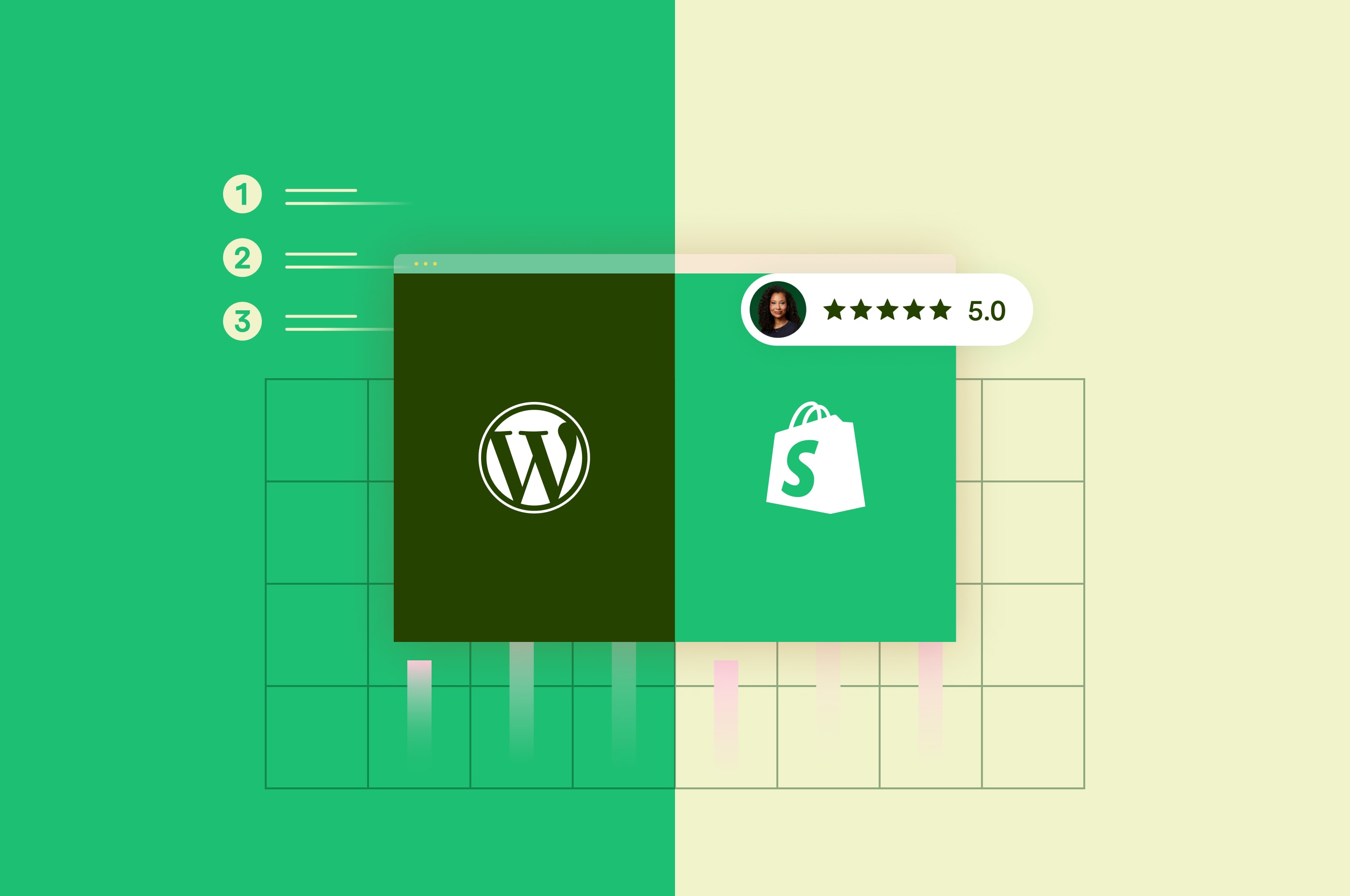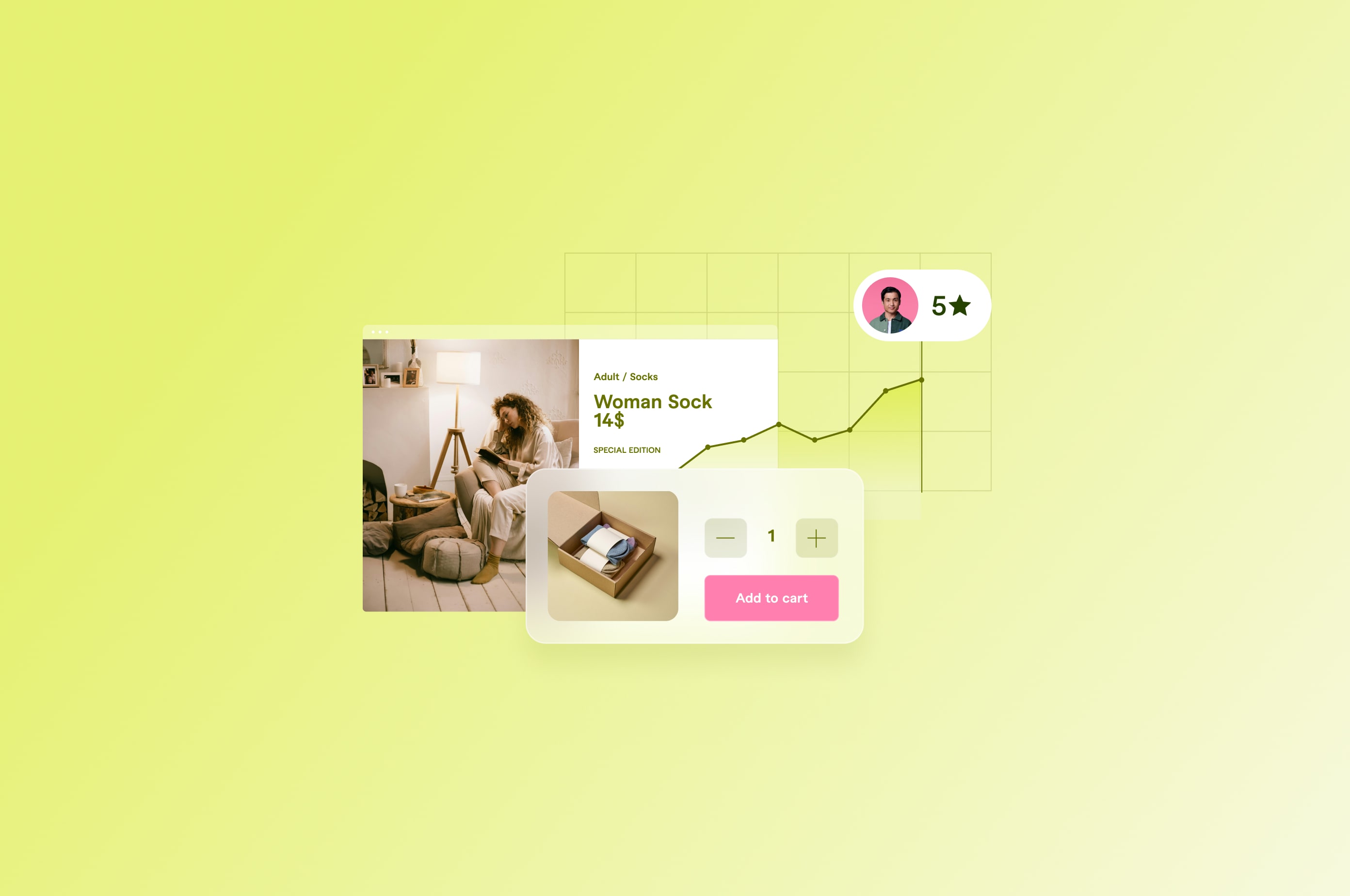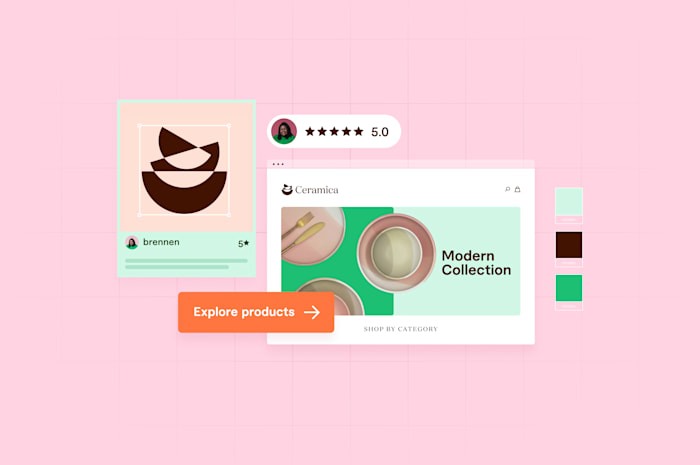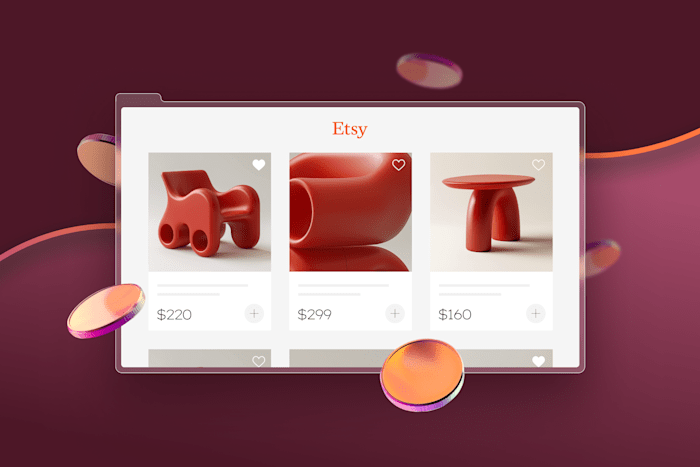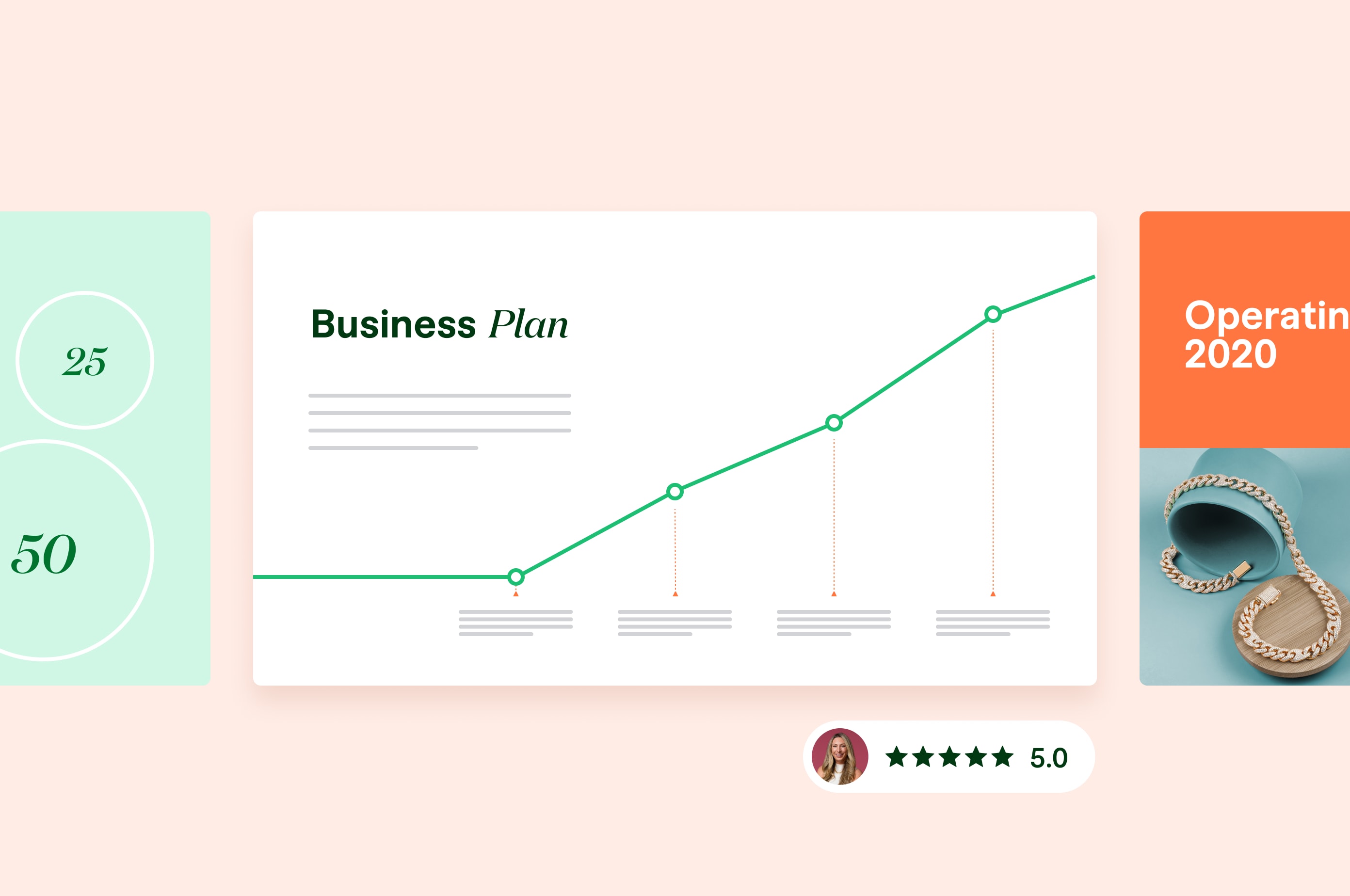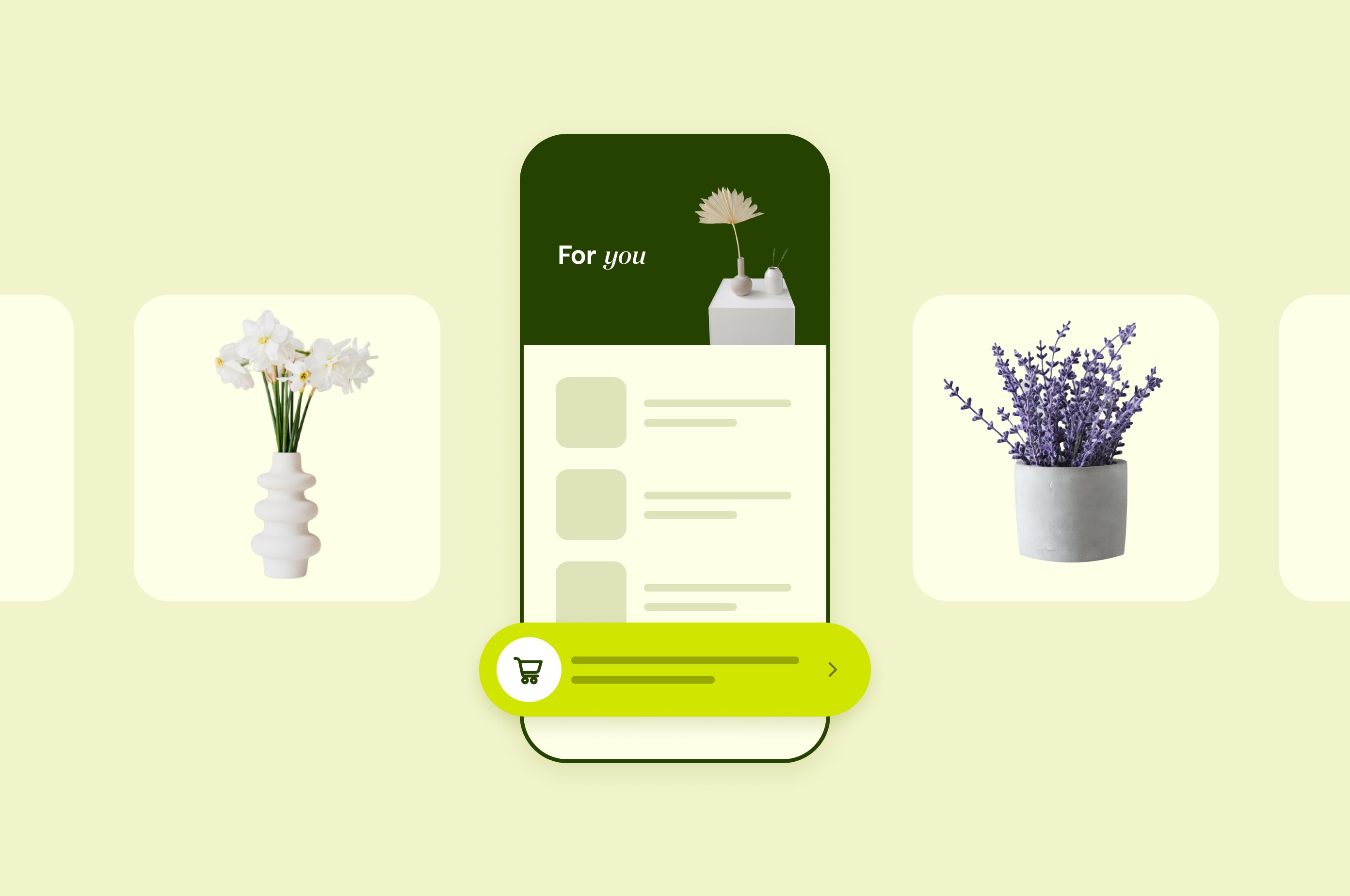Shopify vs. Etsy: Choose the Right Platform as a Seller
Compare Shopify and Etsy to find the perfect ecommerce home for your online business.
 May 14, 2025
May 14, 2025 9 minute reading
9 minute reading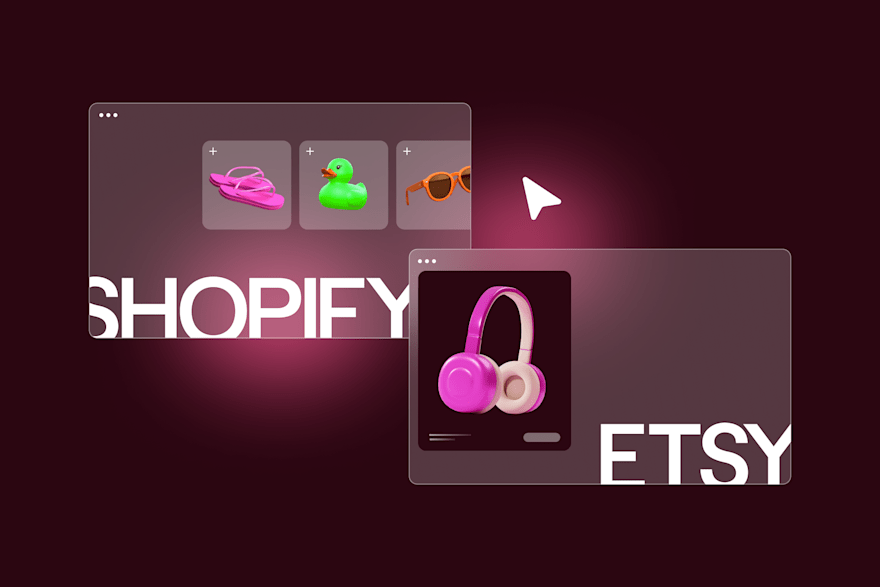
Online shopping is booming, with worldwide ecommerce sales growing from $5.8 trillion in 2023 to an expected $7.5 trillion by 2026.
As more people start selling online, many face a big decision: Shopify or Etsy?
These popular platforms offer different ways to handle store management and business growth. Shopify gives you full control to build your own brand, while Etsy connects you instantly to millions of shoppers looking for special items.
For entrepreneurs starting or growing an online business, knowing which platform fits your needs can make a huge difference in your success.
What is Shopify?
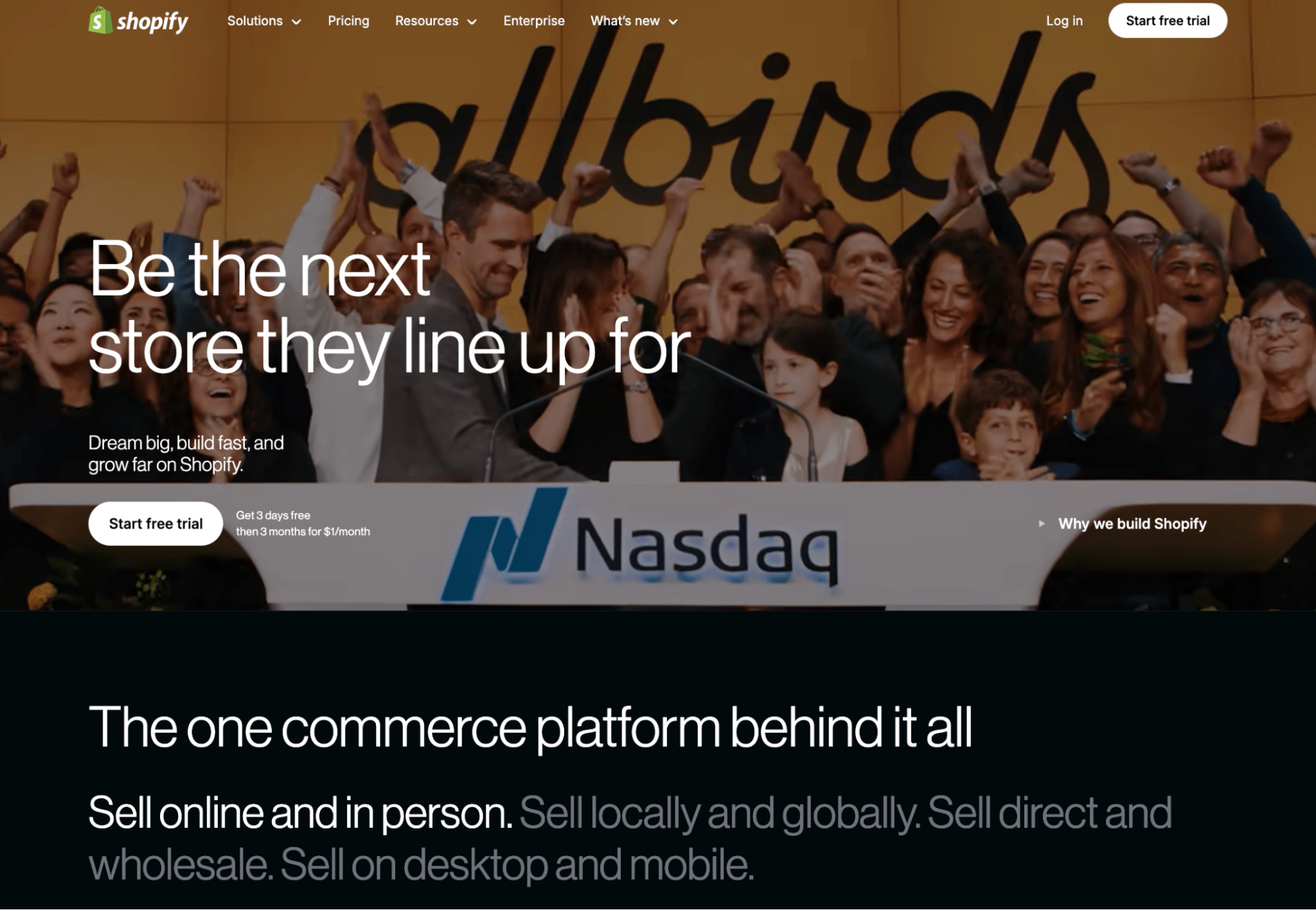
Shopify
Shopify is a complete ecommerce platform that lets you build and run your own shop.
Its simple ecommerce store setup walks you through everything from choosing a design theme to launching your storefront, no advanced technical skills required. Shopify hosts everything on their secure servers with your web address.
Shopify’s main features
Complete payment system. Built-in checkout that works smoothly for customers, with options to accept credit cards through Shopify Payments (no extra fees in many countries) or use alternatives like Shop Pay and PayPal.
Easy product management. Add unlimited physical or digital products, track inventory automatically, and manage all your orders in one place.
Ecommerce marketing tools. Connect with email marketing and social media platforms like TikTok and Instagram, improve your Google search rankings, and sell across multiple platforms including Etsy.
Shopify App Store. Access over 8,000 apps to add new features as your business expands, and handle high traffic and big sales events without technical problems.
Support when you need it. Get help 24/7 from Shopify's team. Plus, access guides and community forums to learn more about running your store.
Shopify charges a monthly subscription fee (with different price levels), but in return, you get complete control of your Shopify store while they handle all the technical aspects so you can focus on your products and customers.
What is Etsy?
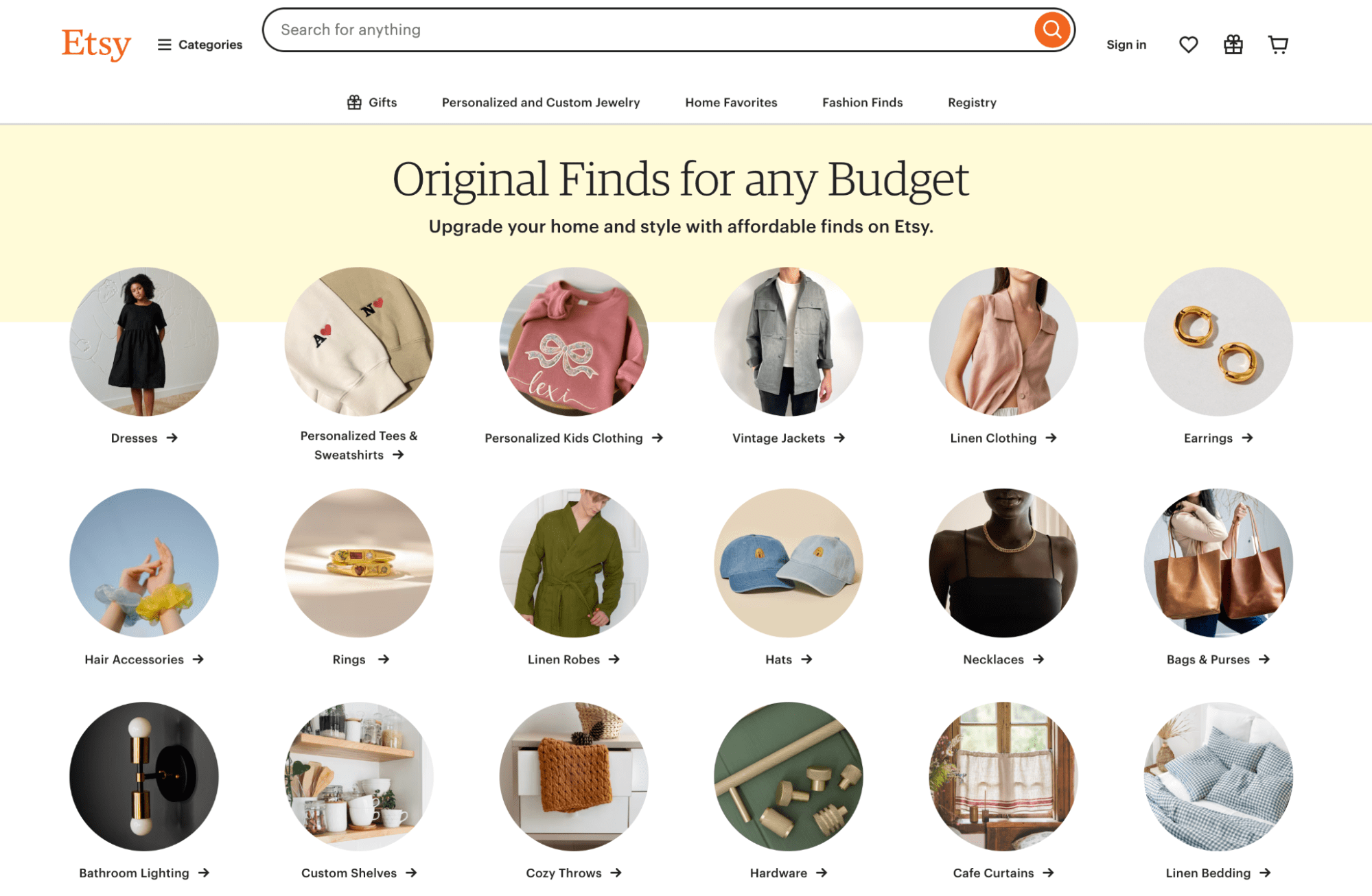
Etsy
Etsy is an online marketplace where people sell handmade, vintage, or unique products. Unlike Shopify, where you have your own separate store, Etsy brings many independent sellers together in one big shopping destination.
Some features unique to Etsy
Ready-made customer base. Etsy has over 96 million shoppers globally looking for unique, handcrafted, or personalized items. This built-in audience can help new Etsy sellers get discovered without building their own following first.
Quick and easy setup. You can open an Etsy shop with minimal technical skills. Just create product listings with photos and descriptions, and Etsy handles the website design, checkout process, and payment processing.
Fee structure. Etsy charges listing fees, transaction fees, and may charge for additional services like off-site advertising. These costs can add up as your sales increase and must be factored into your ecommerce strategy.
The Etsy marketplace is good for entrepreneurs who want to start selling quickly with minimal setup and access to an established audience.
Etsy also offers promoted listings, which let you pay a bit extra to feature your items more prominently in search results, helping new sellers gain visibility quickly. Some sellers also upgrade to Etsy Plus for additional shop customization and promotional perks.
However, the fees, branding limitations, and marketplace competition can sometimes limit growth for businesses wanting to build a distinct ecommerce brand.
Shopify vs. Etsy comparison: Key differences
Business models and target audience
Many sellers start on Etsy to see if people like their products, then move to Shopify when they're ready to build a bigger business.
For example, the Polder family behind Old World Kitchen started on Etsy but soon outgrew the marketplace’s constraints, ultimately thriving after migrating to Shopify. After the switch, they saw conversions climb, gained more control over their brand, and expanded their product line beyond handmade items.
Shopify
Shopify is your own customizable website where you pay a monthly fee to have complete control over how your store looks and works.
It's best for people who want to build a serious brand, sell many or higher-priced products, and are ready to invest in growing a business that stands out.
Some things to know:
You need to find your own shoppers
You make all the decisions
You can design your store any way you want
Shoppers only see your products
Better for long-term growth
Optimize & Customize Your Shopify Store
Etsy
Etsy is a popular marketplace where you can quickly list handmade goods or unique items and pay per-listing fees plus a percentage of sales.
It’s good for creators who want immediate access to Etsy's existing shoppers without building a website from scratch or for those testing if their products will sell before committing to a bigger business setup.
Some differences:
Etsy brings shoppers to you
You must follow Etsy's rules
Your shop looks similar to others
Buyers can easily find your competitors
Pricing structure
If you sell less than 10 items a month, Etsy usually costs less. Once you sell 15+ items monthly or more expensive products, Shopify saves you money because you don't pay fees on each sale.
Shopify
Shopify charges a monthly fee that stays the same no matter how much you sell. You don't pay extra fees for each item you list. This works better for sellers with lots of products or higher sales.
Fees include:
Fixed monthly payment ($29-$299)
Payment fees on each sale (2.9% + $0.30)
Optional: special designs, apps, website name
Etsy
Etsy is cheaper to start because there's no monthly fee. Instead, you pay to list each item plus a percentage of each sale amount, plus payment processing fees. These small fees add up quickly when you sell more.
Etsy fees include:
$0.20 to list each item
6.5% of each sale amount
Payment fee (3% + $0.25) on each sale
Ad fees (12-15% of sales from Etsy ads)
Setup, design, and customization
On Shopify, you control the entire shopping journey from homepage to checkout. On Etsy, potential customers shop in Etsy's environment, often seeing competitor products alongside yours.
Shopify
Shopify lets you build a complete website that's fully yours. You pick your domain name, choose from many design templates (Shopify Themes), and can change almost anything about how your store looks and works.
Setting up takes more time and some basic tech skills, but gives you total control over your brand's look and customer shopping experience. You can customize colors, fonts, page layouts, and add special features through apps.
💡 Tip: For more advanced customizations, you can invest in Shopify development services, where experts build unique features and integrations tailored to your business needs.
Etsy
Etsy setup is much faster. You simply fill out forms, upload product photos, and your shop is ready.
The downside is all Etsy shops look similar with the same basic layout. You can only customize your shop banner, logo, and product photos. Your store follows Etsy's rules and design, making it harder for your brand to stand out.
Marketing features
Etsy provides immediate access to shoppers but limits your marketing control. Shopify requires you to build your own traffic, but gives you complete freedom over how you market your business.
Shopify
Shopify requires you to find your shoppers since you're running a standalone website. You'll need to use social media, run ads, build email lists, or improve your ecommerce SEO to get visitors. This takes more work and money but gives you direct access to your customers.
Shopify doesn't have built-in ads but connects easily with Facebook, Google, and Instagram ads so you can advertise anywhere. You can add product videos, customer testimonials, and detailed image galleries to create engaging shopping experiences.
Etsy
When you list products on Etsy, they can appear in Etsy searches without you doing extra work. This built-in traffic is Etsy's biggest advantage, especially for new Etsy store owners.
Find a ecommerce consultant for hire
Product management and selling features
Both platforms let you track orders, communicate with customers, and manage shipping, but Shopify provides more flexibility for complex businesses with multiple products or fulfillment needs.
Shopify
Shopify gives you powerful tools to manage large product catalogs with unlimited listings and variants (like different sizes, colors, or materials).
Adding products takes more steps, but you can organize items into collections, set inventory alerts, and track stock across multiple locations. You can easily sell digital products, subscriptions, or even services alongside physical items.
Etsy
Etsy has a simpler listing process. You can add a product in minutes by filling out a form and uploading photos.
However, Etsy limits you to 10 variations per item (like sizes or colors) and charges a fee for each listing. Digital downloads are supported but with fewer features, and Etsy's systems work best for physical handmade or vintage items.
Scalability and growth potential
Etsy is great for starting out, while Shopify offers a clearer path for long-term business growth beyond the marketplace.
Shopify
Shopify makes global selling easier with multiple language options, currency conversion, and international shipping settings. You can create localized versions of your store for different countries and offer different products in each market.
When it comes to advanced functionality, Shopify’s extensive third-party app integrations offer more scalability.
Some growth features include:
No sales limits
Works with many sales channels (social media, marketplaces, retail)
Connects with accounting, shipping, and inventory systems
Multiple staff accounts
Supports B2B and wholesale
Etsy
Etsy automatically shows your products globally, which is convenient, but offers less control over international settings. Shopify requires more setup for global selling but provides more options for serious international expansion.
Etsy’s limitations include:
Limited to selling on Etsy platform
Basic reporting tools
Fewer integration options
Higher fees as sales grow
Find an eCommerce specialist for hire
Community and customer support resources
Shopify has a well-rounded support program, while Etsy has limited support options but an active Seller forum.
Shopify
Shopify offers 24/7 support through live chat, email, and phone to help with technical issues or account questions. You can usually get help within minutes. Shopify also has extensive help articles, video tutorials, and a large community forum where store owners share advice.
Etsy
Etsy provides email support and a help center, but lacks live phone support for most sellers. Response times can take 1-2 days during busy periods.
However, Etsy has a very active seller community with many Facebook groups, Reddit forums, and local meetups where sellers share tips and support each other.
When to use Shopify
Shopify is better for bigger businesses or ones that want to grow. If you sell a lot each month, Shopify's monthly fee can be cheaper than paying fees for each item you sell elsewhere.
If you have a clear ecommerce business plan and expect your online store to grow—whether through higher sales volume, expanding product lines, or international shipping—Shopify’s robust features and scalability will serve you well.
Choose Shopify if you:
Want to control how your brand looks
Plan to grow your business
Can handle your own marketing
Want detailed sales reports
Prefer paying a set monthly fee
When to use Etsy
Etsy works best for small sellers who make handmade or unique items. It already has many shoppers looking for special products.
Choose Etsy if you:
Are just starting out or testing a new product
Want customers to find you right away
Don't want to manage a whole website
Are not ready to spend a lot on marketing
Hire ecommerce experts to grow your online business
No matter if you pick Shopify or Etsy, getting help from experts can make your shop more successful.
Fiverr lets you find skilled ecommerce professionals who know both platforms well. They can set up your store, take better product photos, improve your search rankings, and create marketing plans that work.
Save time and avoid mistakes by working with Fiverr freelancers who understand what makes online stores successful. Their experience can help your ecommerce business grow faster and easier.
Shopify vs. Etsy FAQs
Is Shopify or Etsy better to sell on?
Shopify is better for entrepreneurs who want to build a brand and have complete control over their store design and customer experience. Etsy is better for creators of handmade or unique items who want immediate access to an existing marketplace of buyers.
Why switch from Etsy to Shopify?
Many small business owners switch from Etsy to Shopify when they outgrow Etsy's limitations and want to establish their own brand identity separate from the marketplace.
The switch often makes financial sense once sales volume increases, as Shopify's flat monthly fee becomes more economical than Etsy's per-transaction fees.
Does Shopify cost more than Etsy?
Etsy is typically cheaper for beginners with low sales volume since it has no monthly fee, only charging listing fees and transaction percentages.
Shopify becomes more cost-effective once you're selling 15+ items monthly or higher-priced products, as its fixed monthly fee doesn't increase with sales volume.
How successful is selling on Shopify?
Selling on Shopify can be highly successful for entrepreneurs who invest in marketing to drive traffic to their store and create a distinct brand experience. Success depends largely on your products, marketing strategy, and business model rather than the platform itself, though Shopify provides robust tools for growth and scalability that many successful online businesses rely on.
